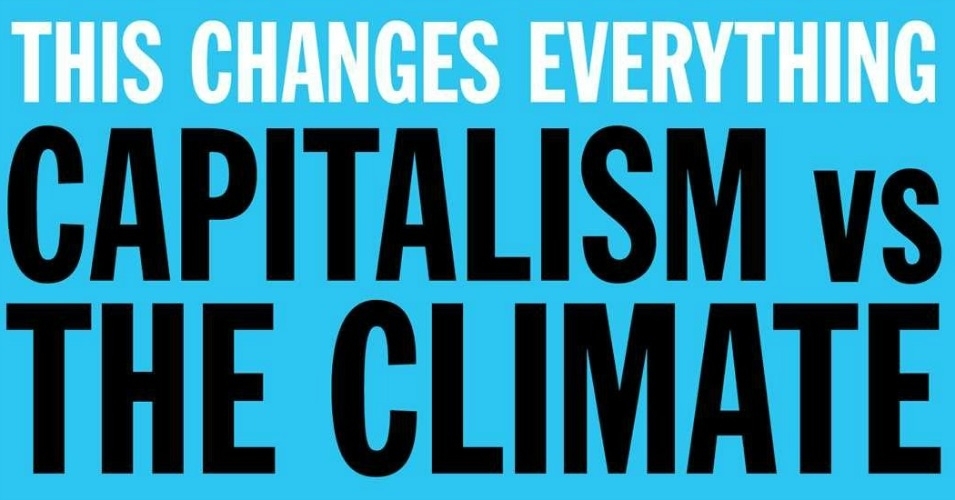November 9, 2014 – You may not agree with her left-wing political activism, but you cannot deny that her hypothesis that capitalism as usual is no longer possible if we are to successfully deal with climate change. In her book, “This Changes Everything: Capitalism vs. The Climate,” she argues that the timing of the climate change crisis couldn’t be worse but nevertheless not addressing it is tantamount to victimizing a large percentage of humanity and the other life on this planet to increasing catastrophe that will eventually impact all.
In a LinkedIn comment raised in the Global Issues group a few weeks ago I argued that every politician, and every CEO of a fossil fuel and energy company should read Klein’s book, and hopefully, take its message to heart. Where Elon Musk sees Mars as a way out of planet-ending extinction, Klein argues that Earth is where we are and we have just enough time to meet the climate crisis before it gets out of hand. She sees fear as the prime reason we are holding back. That our free-market ideology and the governments we are currently electing are delaying tackling the challenge. And that social movements akin in scale to the civil rights movement of the 1960s and the anti-apartheid conviction by national governments in the 1980s are necessary for humanity to address global warming.
Klein takes us on her life journey and on visits to a Heartland Institute conference of climate change deniers bankrolled by business interests, an academic think tank focused on designing geo-engineering solutions to block sunlight or dump particulate matter in the stratosphere, and United Nations-sponsored conferences where delegates break down crying because of lack of consensus on what to do.
She acknowledges that to defeat climate change we must break “so many rules at once – rules written into national laws and trade agreements, as well as powerful unwritten rules that tell us that no government can increase taxes and stay in power.”
Where she and I disagree is on immediate solutions. She would forgo a carbon tax, a first stage remedy in my opinion. and tackle climate change by introducing guaranteed minimum incomes for everyone. This solution of income redistribution would then foster a spirit of cooperation for all humanity to tackle climate change both at a personal and national level. It is her steadfast belief that those dispossessed, the wretched of the Earth as Franz Fanon described them, would then be given a voice in government decision making, and with that voice they would rescue the planet from “ecocide.”
The term ecocide was first introduced in the 1970s when some of us began to realize that the patterns of the past were no longer the norm when looking at climate, when we were observing an accelerating downward trend in biodiversity in the oceans, on land and in the air. Defined as ecocide we were acknowledging that humanity was playing a part in this ecosystem destruction. As a result, today, ten countries have enshrined laws of ecocide as crimes against humanity and the planet.
To me Klein is a wonderful idealist and that her solution although appealing doesn’t take into consideration human nature. I agree with her that addressing climate change as a moral issue is an absolute. She draws analogies to the 19th century actions that finally led to the abolition of slavery in the Western World and quotes Adam Smith in his book “The Wealth of Nations” describing capitalism’s reason for ending the abhorrent practice based on pragmatic financial arguments rather than moral ones. She then goes on to note that Smith’s approach did nothing to end slavery and it wasn’t until emotion rather than pragmatism entered the picture that slavery was abolished. It took polarizing rhetoric and a civil war.
Klein notes parallels between the institution of slavery and unfettered capitalism, the latter which she blames for global warming. She sees the need for a collective moral and emotional uprising on the world stage as the means to overcome our collective fear to act. She believes we can unwrite the last 150 years of the Industrial Revolution driven by James Watt’s invention of the steam engine and its voracious descendants with their demand for more and more energy. She argues that humanity’s march away from a dependence on the natural world to sustain us can then be revisited and the high-risk behaviours associated with fossil fuel extraction can finally end. Only in this way will we address climate change.
I, on the other hand, believe that we can institute a progressive carbon tax across all governments across the planet. That these taxes would be focused on extractive industries and polluters, and that the money raised would be put into projects to mitigate risk from climate change. Through a carbon tax I believe we can accomplish, to a degree, the redistribution of wealth that Klein argues is the answer. That by lowering income taxes for those most impacted by global warming we can make our democracy more inclusive. And that through carbon tax wealth redistribution we can provide the necessary financial assistance to help other nations most at risk from extreme weather events and rising sea levels. Interestingly, The Globe and Mail, a national newspaper here in Canada that has a strong business orientation came out with a similar proposal on its editorial pages on November 7th.. Let’s hope our political leaders take note.













A collective awakening, it will require us to pool our visions and work collaboratively to see what the big picture looks like with everyone in it.
Requires an adjustment in our speech patterns and intent. A powerful force for good are good words at the right time, ‘like apples of gold…’.
Compassion is a force for holistic change and we can pool our compassionate resources to create a laser.
Compassion’s Laser focused on Literacy.
Climate literacy too…
It all sounds like a lot of delusional idealistic gibber-jabber. The actual problem, and only possible solution, relates mainly to overpopulation and each human being’s desire of to lead a better more resource/energy intensive life. All else is a counterproductive distraction and diversion.
Look at the Congo. What human is going to let his kids starve when he can feed them at least one nutritional meal of bush-meat gorilla? Neither the handful of remaining mountain gorillas teetering at the brink of extinction, nor the impoverished human over-population teetering at the edge of starvation, gives a damn about climate change. Yet mankind in the developed world can’t even organize itself well enough to save a few scores of remaining gorillas and a few million impoverished native African humans. If there is major profit to be made today, tomorrow’s climate and the last remaining gorillas will just have to fend for themselves. In grossly overpopulated Haiti, humans are eating mud pies because they don’t have any gorillas.
No governmental measures will ever control or significantly moderate either natural human desire for a better life or unnatural carbon emissions. In any case, universal AI will soon overtake both carbon emission/climate change and all public sector efforts to regulate carbon emissions. Interestingly, Naomi naively supposes socialistic wealth redistribution must be part of the answer to carbon control. She is sort of right, but for all the wrong reasons. AI will vastly increase industrial and agricultural productivity, lower clean energy costs, diminish the economic value of human labor, and impoverish billions who will be thrown out of work.
Governments will be forced to either implement some form of socialistic trickle-up economics (as opposed to capitalistic trickle-down) that actually provides some cake for the masses or else countless “citizen committees” will reintroduce the ruling class to the guillotines.
Hi Allen, Your panacea of universal AI does not address carbon in the atmosphere and will do nothing to stabilize the climate of the planet in the short or even medium term. We are stuck with the consequences of the carbon we have already burned for centuries into the future and we cannot continue to burn more. No application of AI will rescue us from this.
((Your panacea of universal AI does not address carbon in the atmosphere and will do nothing to stabilize the climate of the planet in the short or even medium term.))
The only “panacea” I’ve ever advocated is drastic population reduction. That is the only thing that could make significant sure-fire short-term difference. Medium-term; the robots are coming whether you like it or not, and that will make a huge difference. Universal AI is coming because it is driven by market forces and individual desire for profit. It will revolutionize the way we live and work. We don’t have universal robots yet because we don’t have universal AI yet. Imagine an electronic brain package the same size and weight of a small box of matches that has almost unlimited intelligence and knowledge. Put that brain into a universal robot body and get out of its way. Universal robots will be able to work more competently than humans 24-7, and they don’t get paid, get sick, go on strike, have union work rules, or sue their employers. Older robots will be building newer robots and replacement bodies for worn-out old robots. Because they are “backed up” outside the robot bodies they operate, robot minds don’t die. They won’t need workman’s compensation or social security. When a robot mind breaks or wears out its body, it gets a new body built by other robots.
Most people don’t drive electric cars because they either have limited range or cost lots more than ICE cars. Why do electric cars cost so much? Because expensive human labor builds the batteries, controllers, mines and smelts the copper for the motors, works in the tire factories, does the assembly work, etc. Presently, an 85 kWh Tesla S costs about $120,000 plus taxes. What if a Tesla S costs only $12,000? Why would anyone buy and drive anything else? If everyone were driving Tesla Ss, we would need a lot more electricity. Where would all that extra electricity come from? Right now, most electricity comes from burning carbon-based fuels or problematic nuclear plants. Why not use carbon-free sources? Because carbon-free sources cost more. Why do carbon-free sources cost more? Because it takes more expensive human labor to produce them. What if cheap robot labor, the same sort of cheap robot labor that could produce a $12,000 Tesla S, could also produce cheap carbon-free electricity?
In Austin, Texas, the average residential home is about 3,000 square feet, and has an insulation index of about R-12. Summer-time electric bills run $400-$600 per month. There is, however, one 3,000 square foot Austin residence that looks much like all the others, but it has 10” thick fireproof styrofoam-bead/concrete walls with an insulation-index of R-35. Why don’t most Austin homes have concrete foam walls and triple glazed windows that produce the high R-factor? Home building is expensive because human labor is expensive. The R-35 home costs 35% more to build than conventional construction. So the home-owner monthly mortgage payment of the R-35 house is 35% higher. So the $2,800 monthly payment for conventional R-12 construction increases to $3,780. That’s each and every month of the year, including the 7-months where high insulation R-factor has little impact on energy usage. Suppose the R-35 home saves $500 per month for the five scorching hot months. That produces a yearly savings on electricity usage of $2500. But the annual mortgage payments increase by almost $12,000, for a net loss of $9,500. It costs the homeowner an extra $9,500 per year to live in his R-35 house and reduce his carbon footprint by 35%. Not many Texans think that is a good plan.
But what if the same sort of universal AI robots that can build $12,000 Tesla cars were building R-35 homes? The homes would be using less than half the electricity in the five hot months, but the electricity wouldn’t be coming from a coal or NG-burning power plant; it would be coming from the robot-built roof solar panels and large battery storage system of the R-35 home built by the same tribe of universal AI robots that build the $12,000 Tesla S. Suppose the robots can build the R-35 house in Austin for only $80,000, and it never has an electric bill plus it powers the family Tesla S. Texans have no problem with the elementary math. The monthly mortgage payment of the robot-built R-35 home is about $900, and there is no electric or gasoline bill. The $12,000 Tesla is just a free bonus that comes with the house.
The key to understanding carbon-free energy is understanding labor costs. The key to understanding labor costs is understanding strong, cheap, reliable, electronic AI. All those robots that will replace the human labor force will need a lot of electricity, but the robots will be able to produce virtually unlimited cheap carbon-free energy in nuclear environments that would be lethal to humans.
Elon Musk may say he is worried about the coming AI singularity, but he will be among the first to put AI robots to work in his Tesla car plant, his big Nevada battery plant, and in his SpaceX operations.
If you want to do something to address the atmospheric carbon buildup, and you refuse measures that would affect drastic population reduction, stop trying to promote big world-government control and regulation of carbon and start promoting universal AI.
It doesn’t take big world government to control carbon. It takes good policy development, carrots and sticks, and commitment from all nations.
Although I agree that world population underlies the problems we face, short of world governments imposing global birth control, limited family sizes or the eruption of a global pandemic, it would seem we have no current means by which to stop the current population tide. Consider that most of it is happening in the Developing World, any attempt of population control with assistance from the Developed World would smack of colonialism.
We can hope that Developing World states request assistance or develop policies that can help them manage their exploding populations (particularly those in Subsaharan Africa) or witness increasing scarcity and a scramble for resources. Shades of Europe at the outbreak of its two wars that engulfed most of the planet.
And AI, although it can play a part in making technology cheaper and ubiquitous, it still doesn’t address population growth. But it can address the buildup of carbon.
((It takes good policy development, carrots and sticks, and commitment from all nations.))
That amounts to stealing from Peter to pay Paul. In the present human-labor based economy the carrots are mostly an illusion. Those carrots involve government using the sticks to beat Peter into giving part or all of his labor and wealth to Paul, who is pleased to believe he is earning his carrots merely by emitting less carbon. Paul doesn’t really give a damn about Peter as long as government transfers Peter’s carrots to him. The basic problem with the carrots and sticks approach is that any attempt to take Peter’s carrots to give to Paul will reduce the quality and total number of carrots produced. Without Peter’s free market carrots you are left only with the sticks. To make any carrot and stick plan work over the long-term you must have an ever increasing supply of carrots. You will never get enough carrots by beating Peter. That’s where the huge gains in productivity by AI robots comes in.
AI robots can easily bury Paul in carrots and no one needs to beat Peter with sticks. The AI robots will produce more and better carrots than Peter ever dreamed of. Then, government’s main job will be to control distribution of robot-produced carrots to all whose behavior complies with public interests. If you want a 50-point IQ boost AI mind-meld, a free 3,000 square foot air-conditioned home with glass windows, hot and cold running water, flush toilets, big screen TV, robot servants and companions, plus more carrots than you can eat and a free Tesla S, you must refrain from crime and limit your reproduction to less than replacement rate. I’m guessing that’s a deal that 99% of humankind will go for. Those humans who reject that deal will likely wind up segregated and forgotten in a remote medical experiment prison run by robots.
That last part Allen is what scares me most about your vision of our future. I fully appreciate the challenge of overpopulation and how almost everything on the planet that is wrong points to our over breeding.
But in your solution I see all kinds of scenarios that make the hair on the nape of my neck rise.
There is no doubt the governments in the Developing World are faced with a population bomb that will impact everyone on the planet. We in the Developed World can be of assistance in ensuring the bomb doesn’t blow all of us up, and the assistance we provide through technology, education, medical services, and agricultural production, mitigates the crisis allowing for a more humane solution than “medical experiment prisons run by robots.”
((mitigates the crisis allowing for a more humane solution than “medical experiment prisons run by robots.”))
The alternative might be medical experiment prisons run by humans. China brought its population under control with organ-harvesting prisons run by humans. Hope and prayer sure isn’t the answer. What to do with the small percentage that chooses crime instead of compliance with the law is a problem for every society. Before industrialization, most societies just hung, crucified, beheaded, or enslaved and sent their criminals to toil in the fields, mine copper, build roads, row galleys, and rot away in Devil’s Island or Siberian hell holes. At least in the AI robot world the criminal chooses between a comfortable, secure, fulfilling, life and criminality. Up until the time robots come, criminality can often be justified by desperation for survival. Thomas Moore’s Utopia asserts the King Henry VIII crown was hanging beside the roads 10,000 desperate highwaymen every year, yet 10,000 more would be available for hanging the following year. You are objecting to a new world order that would feed the 10,000 and hang or torture only 100 of the most perverse criminals that try to bite the hand that so generously feeds them.
((But in your solution I see all kinds of scenarios that make the hair on the nape of my neck rise.))
Have you ever visited a third-world prison? If you have, I’m guessing you would have had hair rising all over your body.
In the Congo today, it’s a serious crime to eat gorillas. It’s not even a misdemeanor to starve to death. What human would let his own child starve to preserve the world’s last gorilla? You are objecting to the only sort of plan that can possibly arrest population growth and feed the Congo natives a more nutritious diet that doesn’t include gorilla. Once the robot-produced surplus of food becomes available, what do you propose to do with the Congo natives caught eating gorilla?
If the atmospheric carbon/climate-change problem is as severe as you seem to think, then you should be more concerned about the certain survival of the 99% than the possible inhuman abuse of the 1%, especially considering that the 1% is not at all desperate and willfully decides to become criminals.